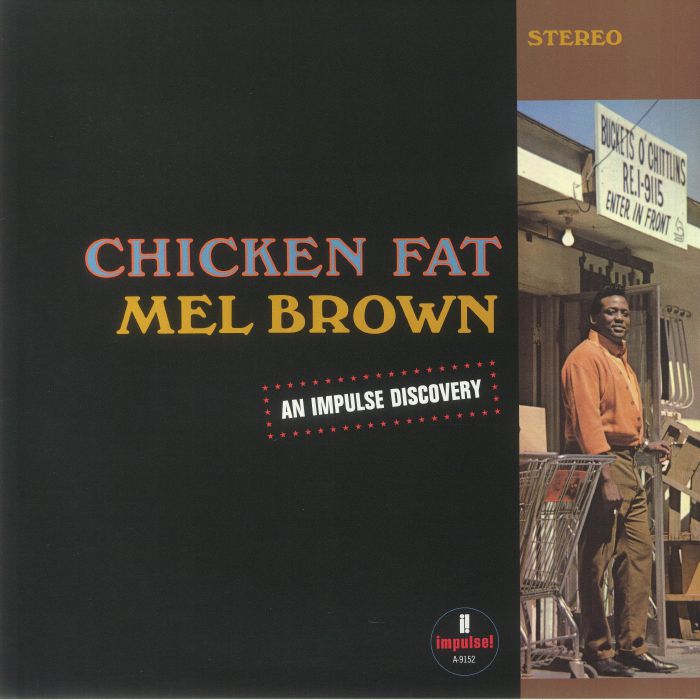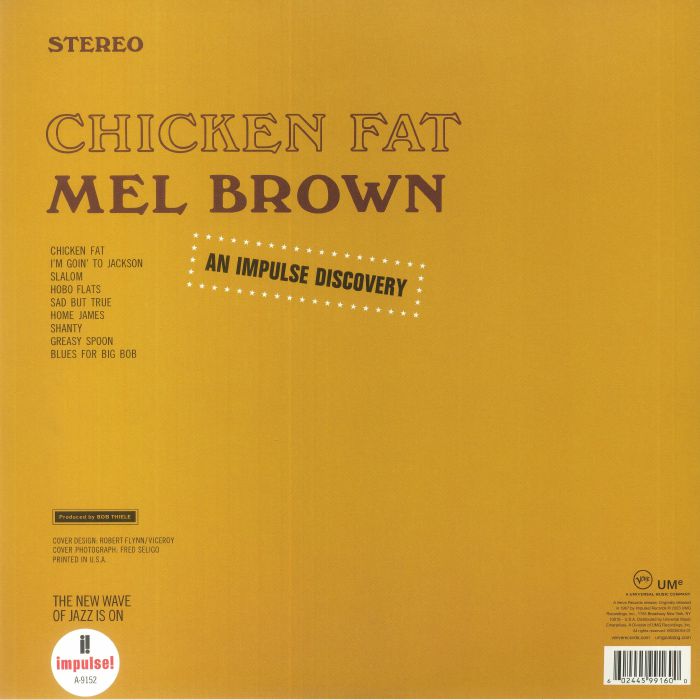Mel Brown was born on October 7, 1939 in Jackson, Mississippi. He backed Bobby Blue Bland on guitar for more than ten years. He recorded most of his albums for the Impulse, which is primarily known for jazz. His music is a blend of soul and funk as well as the blues.
Artist Biography Below by Jason Ankeny
Best known for his decade-plus stint in support of Bobby "Blue" Bland, Mel Brown channeled elements of soul, funk, and jazz to create one of the most distinctive guitar styles in contemporary blues. Born October 7, 1939, in Jackson, MS, Brown received his first guitar at the age of 14 while battling meningitis, spending hours each day studying the music of idols like B.B. King and T-Bone Walker from his sickbed. His father, John Henry "Bubba" Brown, a gifted amateur guitarist who often backed Delta legend Tommy Johnson, was another seminal influence. After recovering from his illness, Brown joined the Duke Juniors, a teenaged spinoff of the popular local society band the Duke Huddleston Orchestra. Word of his prodigious abilities spread quickly throughout the region, and at 15, he played a series of gigs backing the great Sonny Boy Williamson. After a brief stint in Los Angeles, Brown returned to Jackson in 1955, honing his skills under Huddleston before permanently settling in L.A. three years later. After a six-month stretch with West Coast R&B singer Jimmy Beasley, Brown spent two years backing R&B great Johnny Otis. In late 1960, he toured with the Olympics, followed by a two-year tour of duty with the great Etta James. Most significantly, while touring with James he swapped his Les Paul for a hollow-bodied Gibson ES-175, later crediting the instrument for the warm, rich tone that set him apart from rival guitarists.
By 1963 the grind of touring forced Brown off the road. He returned to L.A. and resumed his collaboration with Otis, enjoying an extended residency at the Club Sands. He also launched a session career, playing on records by everyone from Bobby Darin to Bill Cosby as well as T-Bone Walker's Funky Town LP. His contributions so impressed ABC/Impulse! producer Bob Thiele that he invited Brown to cut his own album for the label: 1967's Chicken Fat, a wonderfully greasy blues-funk outing pairing Brown with fellow guitarist Herb Ellis, remains a cult classic. A series of impressive LPs including The Wizard, I'd Rather Suck My Thumb, and Big Foot Country Gal followed in quick succession before Brown joined Bland in 1971, appearing on the singer's classic California Album two years later. During his stint with Bland, the guitarist also moonlighted behind blues legends John Lee Hooker, Lightnin' Hopkins, and Roy Brown, and in 1976 he relocated to Nashville, where he maintained an even busier session schedule than in Los Angeles. Upon resuming his collaboration with Bland, Brown made the decision to temporarily abandon guitar in favor of the piano. He remained with the singer until 1982, putting his performing career on hiatus and moving to remote northeast Mississippi in an attempt to escape the music business.
Brown resurfaced in 1983 as a member of the house band at the legendary Austin, TX, blues joint Antone's. In the years to follow, he backed everyone from Buddy Guy to Stevie Ray Vaughan to Clifton Chenier. In 1986, he accepted Albert Collins' offer to join his band the Icebreakers, recording the acclaimed LP Cold Snap before returning to Antone's. In 1989, he resumed his solo career with If It's All Night, It's All Right, released on the club's eponymous label. A few months later Brown headlined the Kitchener, Ontario, venue the Pop-the-Gator Club, finding the experience so much to his liking that he relocated to Canada in early 1990. There he formed a new band, the Homewreckers, and steadily toured the southern Ontario nightclub circuit, finally reappearing on wax in 1998 as a guest on Snooky Pryor's Can't Stop Blowin'. Brown's Electro-Fi label debut, Neck Bones & Caviar, followed a year later, winning the W.C. Handy Award for Blues Comeback of the Year. With 2000's co-headlined Double Shot!, he and Pryor earned a W.C. Handy nomination for Traditional Blues Album of the Year. The concert disc Homewreckin' Done Live followed a year later. After another five-year layoff from recording, Brown issued Blues: A Beautiful Thing in early 2006.
Source: AllMusic Biography - Mel Brown
You can also see Mel Brown & the Homewreckers and / or Mel Brown And The Homewreckers on Last.fm.
Read more on Last.fm. User-contributed text is available under the Creative Commons By-SA License; additional terms may apply.


